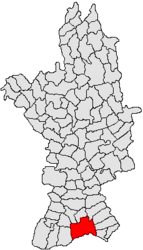world.wikisort.org - Romania
Corabia (Romanian pronunciation: [koˈrabi.a]) is a small Danube port located in Olt County, Oltenia, Romania, which used to be part of the now-dissolved Romanați County before World War II. Across the Danube from Corabia lies the Bulgarian village of Gigen.
This article needs additional citations for verification. (March 2020) |
Corabia | |
|---|---|
Town | |
 Romanian War of Independence memorial in Corabia | |
 Location in Olt County | |
 Corabia Location in Romania | |
| Coordinates: 43°46′25″N 24°30′12″E | |
| Country | Romania |
| County | Olt |
| Government | |
| • Mayor (2020–2024) | Iulică Oane[1] (PSD) |
| Area | 123.19 km2 (47.56 sq mi) |
| Elevation | 35 m (115 ft) |
| Population (2011)[2] | 16,441 |
| • Density | 130/km2 (350/sq mi) |
| Time zone | EET/EEST (UTC+2/+3) |
| Postal code | 235300 |
| Vehicle reg. | OT |
| Website | www |
History
| Year | Pop. | ±% |
|---|---|---|
| 1912 | 9,124 | — |
| 1930 | 8,857 | −2.9% |
| 1948 | 10,772 | +21.6% |
| 1956 | 11,502 | +6.8% |
| 1966 | 14,502 | +26.1% |
| 1977 | 19,705 | +35.9% |
| 1992 | 22,386 | +13.6% |
| 2002 | 21,932 | −2.0% |
| 2011 | 16,441 | −25.0% |
| Source: Census data | ||
Beneath Corabia, around the former village of Celei, lie the remains of Sucidava, an old Dacian and Roman town and fortress. Near the town, Emperor Constantine the Great built the longest European bridge over the Danube (2,437 m (7,995 ft)). The bridge was destroyed during the Avar invasions, probably in the 7th century. The ruins also contain an old Roman bath and an old basilica. The name Corabia reflects the fact that the new settlement was built from the remains of a wrecked Genoan ship (corabia is the Romanian language term for "sailing ship", specifically used for "galley"). It became a thriving port in the 1880s.
Under the communist regime, Corabia developed as a considerable manufacturing town, with a sugar mill, furniture factory, tannery, a fiber manufacturing plant, and various other facilities. However, in more recent times the town's population has dwindled. Many inhabitants have migrated to larger towns in the wake of the closure of many of Corabia's factories.
Geography
Corabia is located in the southern part of Olt County, on the left bank of the Danube, on the border with Bulgaria. It administers two villages, Tudor Vladimirescu and Vârtopu. The town houses a football club, several shops and bars, the remains of the Roman castrum Sucidava, dating back to the Roman period and featuring the "Secret Fountain" (an unusual piece of engineering); the Holy Trinity Orthodox Cathedral (one of the largest buildings of its kind in Romania), as well a monumental statue in the middle of the town square commemorating the use of Corabia's facilities in the initial attack during the Romanian War of Independence of 1877. Corabia also has an important archaeological museum with, inter alia, a remarkable collection of Roman pottery. From the town harbour one can make trips along the Danube, with stops at the nearby Băloi Island.
Natives
- Pavel Chihaia
- Theodor Danetti
- Nicolae Dobrescu
- Valentin Al. Georgescu
- Pola Illéry
- Șerban Ionescu
- Theodor D. Ionescu
- Virgil Mazilescu
- Ion Oblemenco
- Ion Rîmaru
- Robert Săceanu
- Vladimir Screciu
- Cristina Vărzaru
- Ștefan Voitec
Gallery
- Culture House and Archaeological Museum
- City center
- Danube at Corabia
- 1877 Independence War Heroes Monument
- 1 May Street
- Sucidava's Secret Fountain
- Holy Trinity Cathedral
References
- "Results of the 2020 local elections". Central Electoral Bureau. Retrieved 8 June 2021.
- "Populaţia stabilă pe judeţe, municipii, oraşe şi localităti componenete la RPL_2011" (XLS). National Institute of Statistics.
На других языках
[de] Corabia
Corabia ist eine kleine Hafenstadt im rumänischen im Kreis Olt in der Kleinen Walachei, die an der Donau und damit nördlich der bulgarischen Grenze bei Gigen liegt. Der Hafen wurde vor dem Zweiten Weltkrieg vom damaligen Bezirk Romanați genutzt.- [en] Corabia
[ru] Корабия
Корабия (рум. Corabia) — город в Румынии, в жудеце Олт, расположенный на реке Дунай, на границе с Болгарией. Важный румынский порт на Дунае.Другой контент может иметь иную лицензию. Перед использованием материалов сайта WikiSort.org внимательно изучите правила лицензирования конкретных элементов наполнения сайта.
WikiSort.org - проект по пересортировке и дополнению контента Википедии









